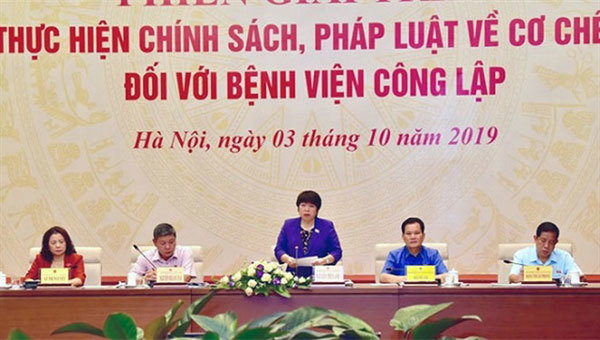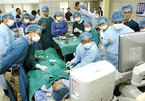 |
| Chief of the NA Committee for Social Affairs Nguyen Thuy Anh delivers a report at Thursday's meeting in Hanoi. – Photo anninhthudo.vn |
The committee’s chairwoman Nguyen Thuy Anh said that since late last year, the committee had set up inspection teams to monitor the implementation of the mechanism which was regulated in the NA’s resolution 10 years ago.
So far, inspection teams had carried out their work in 10 provinces and cities and received reports from other localities on the issues nationwide, Thuy Anh said.
After 10 years, the implementation of autonomy at public hospitals had seen some positive results.
At present, all public hospitals across the country have been given more independence, which helped raise the quality of healthcare services, increase the application of technology in diagnosis and treatment, and improved facilities.
The mechanism had also increased incomes of health workers.
However, the committee had found shortcomings during the implementation, including insufficient instructions for specialised hospitals at the grass-roots level.
There were shortages of controlling mechanisms, leading to unnecessary healthcare services which increased costs for patients as well as for the health insurance fund.
“The meeting today was an open forum with different parties, with an aim to publish all information to people and voters nationwide on the implementation of the mechanism at public hospitals and clarify difficulties, shortcomings and responsibilities of the Health Ministry,” said the chairwoman.
The deputies would also discuss solutions to improve healthcare services, she added.
Difficulties
In the report on the Health Ministry’s responsibilities delivered at the meeting, Minister of Health Nguyen Thi Kim Tien said that the independent mechanism for public hospitals had made great contributions to raise the quality of healthcare services and patients’ satisfaction, and reduce overloading at many hospitals in big cities and provinces.
The Cancer (K) Hospital, the Central Paediatrics Hospital and the National Hospital for Endocrinology had reduced the rate of shared patient beds to between 60 and 70 per cent, the minister said.
Thanks to the mechanism, index of patients’ satisfaction at public healthcare facilities was up to 1.96 in 2018 as compared to 1.92 in 2017.
Along with progress, the minister highlighted difficulties in the implementation of the mechanism, such as imbalance in infrastructure facilities, medical equipment and human resources among hospitals at central and grass-roots levels.
The mechanism allowed the hospitals to set up or dismantle their own organisations or departments.
This could lead to hospitals setting up departments to increase income while dismantling sections which were not profitable.
In fact, healthcare activities require the involvement of all departments in hospitals, said Tien.
The pricing of healthcare services had faced difficulties due to being regulated in many different legal documents.
Solutions
Deputy Nguyen Anh Tri affirmed that the mechanism was correct, but still contained many shortcomings.
Meanwhile, deputy Nguyen Ngoc Phuong said: “For years, the healthcare sector had gained achievements and the Health Ministry had been active in implementing the mechanism.”
“However, many public hospitals had not yet been given absolute independence in investing in facilities and recruiting health workers,” Phuong said.
He asked relevant ministries and sectors to clarify the issues and seek solutions.
Deputy Nguyen Thanh Xuan showed evidence that Cần Thơ City had 13 independent hospitals. But the committee’s inspection teams found that these entities still have to consult management agencies.
In response, Minister Tien said that the autonomy mechanism for public hospitals was indispensable and in line with the trend of public financial reform in the market economy.
“However, the implementation of the mechanism needs attention because the sector’s activities were directly related to people,” she said.
The Health Ministry would co-operate with other sectors to help hospitals gradually overcome the hurdles, she added.
At the meeting, representatives of the Ministry of Finance said they would draft and issue circulars guiding financial independence for district-level healthcare centres.
The ministry also recommended revisions on the Law on Health Care to encourage people to use services at clinics and hospitals at grass-roots level.

Financial autonomy for Vietnam's public hospitals: a blessing or a curse
Just a day after undergoing surgery to remove one of her lung’s lobes, Nguyen Thi H., a 59-year-old woman from the northern province of Bac Giang, could already sit up and chat with other patients in the room.

Grassroots hospitals need to be active in improving their doctors’ capabilities
Prime Minister Nguyen Xuan Phuc recently approved a decision to grant full autonomy for four hospitals for a trial period.
VNS
 The National Assembly’s Committee for Social Affairs continued its meeting on Thursday on the implementation of autonomy at public hospitals.
The National Assembly’s Committee for Social Affairs continued its meeting on Thursday on the implementation of autonomy at public hospitals.